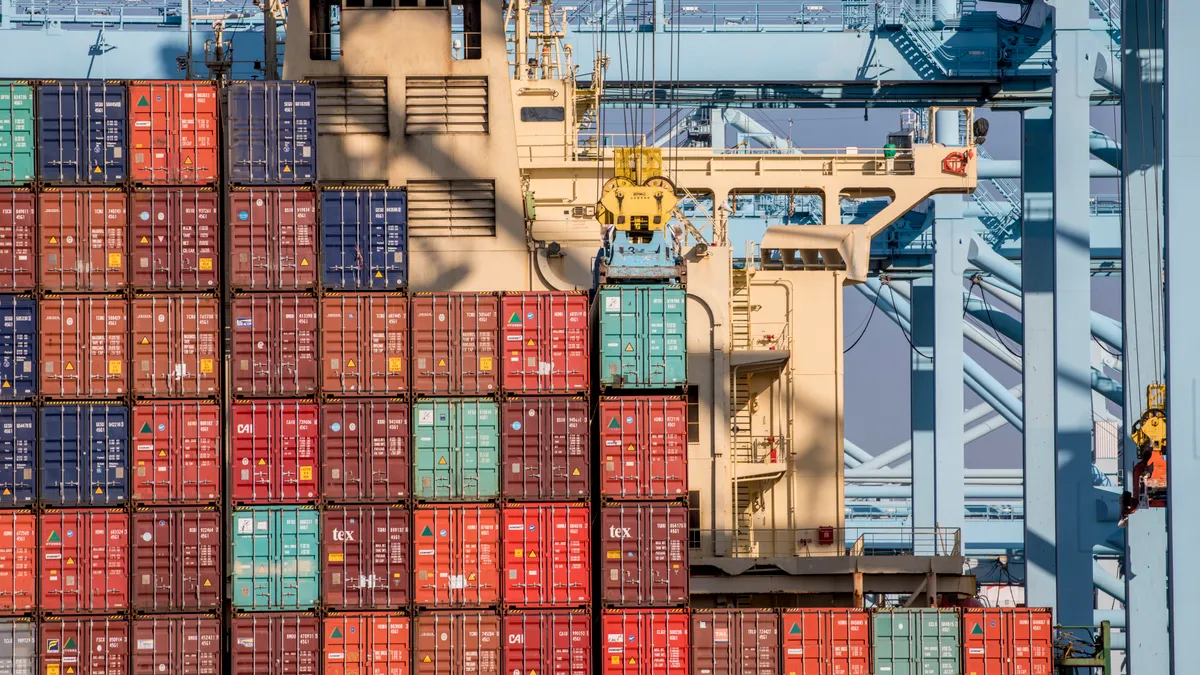Dive Brief:
- The Federal Maritime Commission issued an information demand, requiring ocean carriers and terminal operators to provide details on their detention and demurrage practices, container returns, and container availability for exporters, the agency said Wednesday in a press release.
- The release noted that failing to follow the agency's interpretive rule on detention and demurrage "might constitute a violation of" the Shipping Act.
- The order targets ocean carriers operating in alliances at the Port of Los Angeles, the Port of Long Beach, and the Port of New York and New Jersey, along with terminal operators at the same locations.
Dive Insight:
The news of the information demand came after Commissioner Rebecca Dye updated her fellow commissioners on Fact Finding 29 during a video meeting Wednesday. Fact Finding 29 is the investigation into how the pandemic is affecting ocean shipping.
"I've become more and more concerned about compliance with our rules on demurrage, and detention, and so we're going to begin an enforcement process," Dye told sister publication Supply Chain Dive last week.
Stakeholders that have been vocal proponents of federal intervention in the current shipping environment commended Wednesday's announcement.
"Relative to actions by the Federal Maritime Commission since the Shipping Act was enacted in 1984, this is the biggest action, the strongest step that the FMC has ever taken," Peter Friedmann, the executive director of the Agriculture Transportation Coalition, said Wednesday.
"It will be meaningful, if it changes the ocean carriers' view and utilization of demurrage and detention charges," Friedmann said. "Those charges should be limited to be serving as incentives to move cargo expeditiously."
Weston LaBar, the CEO of the Harbor Trucking Association, said "astronomical detention and demurrage prices" have been a growing concern since the creation of the ocean alliances. A recent survey by HTA and TradeLanes found the average charge per container for detention and demurrage fees is $200 or more for 80% of respondents.
One example LaBar provided is carriers will start the clock for free time when a container comes off a ship, but this doesn't mean a trucking company will be able to get that container.
"The container is not available until there's an appointment that's opened up ... yet the clock starts and in many cases, now — with the congestion that we see — you may not be able to get an appointment on that import until after the last free day expires," LaBar said, noting that carriers will still charge truckers and ask them to dispute it. Disputes are rarely resolved in the trucking firm's favor, because the onus is on the party filing the complaint to prove its case.
The FMC's interpretive rule on detention and demurrage states that fees shouldn't be charged if the trucker or shipper has no control over the inability to move or return the container. The commission issued final guidelines for detention and demurrage last year, but exporters, truckers and other stakeholders have expressed concerns that ocean carriers have not been following them.
The agency's plan to get information on detention and demurrage practices comes as supply chains struggle with port congestion and general capacity constraints stemming from high levels of demand.
"It's a pandemic-driven buying surge unlike any that we've ever seen from the American consumer," Port of Los Angeles Executive Director Gene Seroka said in a port update Wednesday.
Friedmann said following the FMC's detention and demurrage guidelines could result in better cargo movement.
"If that revenue stream was ceased because [carriers] could not charge detention and demurrage unfairly, unjustly, then the carriers, I believe, would have a powerful incentive ... to actually take steps to correct this current dysfunction," he said, noting that simple steps, like informing a customer when a ship is arriving at the port, would go a long way toward improving the situation.
In an emailed statement, Maersk and APM Terminals said they "look forward to fully cooperating with the FMC on their request for information."
"It is a signal that the Federal Maritime Commission was not going to let this rest on its laurels and that they understand this is an important and even dire situation for American companies operating in the supply chain," LaBar said.














